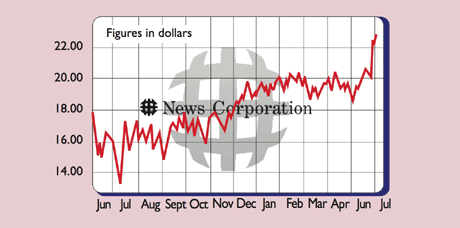
Rupert Murdoch’s News Corp still holds some prize assets. But have the scandals taken too much of a toll on the shares? Phil Oakley investigates.
The business
News Corporation (News Corp) is a global media company. The business has divisions across most forms of media. Its television and cable network business includes the Fox broadcast network and MyNetworkTV, which distributes TV programmes. The business owns 27 channels, including Fox News, FX Network, Regional Sports Networks and National Geographic.
The filmed entertainment division makes films and TV series and includes the iconic 20th Century Fox brand. The satellite TV business includes Italian pay-TV business Sky Italia, a 39% stake in BSkyB, a 49.9% stake in Sky Deutschland and the Asian TV business Star.
News Corp owns prominent newspaper titles such as The Wall Street Journal, The Sun, The Times, The Sunday Times and The New York Post, along with a huge portfolio of Australian newspapers. It also owns Dow Jones Information Services, Harper Collins book publishing and a digital education business.
The history
The business can trace its roots back to the News Limited company, which was created in 1923 in Australia. In 1952, Rupert Murdoch inherited the business after the death of his father. At the time, the company’s main newspaper was The Adelaide News.
During the late 1950s, Murdoch bought the Cumberland Newspapers in New South Wales and the Sydney Daily Mirror. In 1964, he bought a stake in Wellington Publishing, New Zealand’s largest media company. The late 1960s saw his entry into Britain, with the purchase of the tabloid papers News of the World and The Sun. During the 1970s, the business moved into North America, and in 1980 News Corp was created as a global holding company.
In 1981, Murdoch controversially avoided UK monopoly laws when he bought The Times and The Sunday Times in Britain. The 1980s saw a big expansion in America after buying some television networks, 20th Century Fox and Harper Collins publishing. By 1990, however, the company stood on the verge of bankruptcy, as the Sky satellite TV business made huge losses. This slowed the company’s seemingly endless expansion plans – but not for long.
Once out of the danger zone, News Corp began buying assets again. In recent years, News Corp has made some high-profile acquisitions, including social network site MySpace in 2005 and Dow Jones and The Wall Street Journal in 2007. In 2011, a bid to buy all of BSkyB failed, as its British newspapers became embroiled in a phone-hacking scandal. News Corp has recently announced its intention to split the business into separate publishing and media companies.
The chief executive
Rupert Murdoch has run the business since 1952. He was still a student at Oxford University when his father died, and he returned to Australia in 1953 to run The Adelaide News. He has gone on to become one of the world’s richest men with an estimated net worth of $8.3bn. He is also one of the most controversial global business leaders.
Rupert Murdoch was instrumental in the demise of the print unions in Britain after installing electronic production processes at a new plant in Wapping, London, during the 1980s. Never afraid of taking risks, many of his business decisions have taken a long time to pay off.
For decades, political parties on both sides of the Atlantic who have sought the endorsement of his influential newspapers have courted him. However, the ongoing investigation into phone hacking at the News of the World, and the resulting concerns of News Corp’s shareholders, could mean that Mr Murdoch’s influence has peaked.
Should you buy the shares?
There’s no doubt that News Corp has some good assets. But after splitting the business in two, will they be worth any more than they are now? The media and entertainment business looks to have the best growth prospects, as households seem happy to pay for News Corp’s portfolio of TV channels and entertainment products.
However, the publishing business faces lots of problems. Newspaper revenues continue to decline while the business will need large amounts of investment in digital media. On top of that, it’s impossible to know how big the legal liabilities from the phone-hacking scandal could end up being. There’s also the question of whether the publishing unit can become a powerful force in digital education products.
Then there is the issue of corporate governance. The Murdoch family will retain a 40% voting stake in both companies, meaning that it will be difficult for their dominance to be checked. Moreover, the shares are not cheap. They have risen by 25% already this year and offer a paltry dividend. It looks as though the shares don’t offer much upside in the short term. Once demerged, the publishing business could be an interesting value investment, but we’d pass on the shares for now.
The numbers
Stockmarket code: NWSA
Share price: $22.29
Market cap: $54.2bn
Net assets (Dec 2011): $27.9bn
Net debt (Dec 2011): $4.8bn
P/e (current year estimate): 16.0 times
Yield (prospective): 0.8%
What the analysts say
Buy: 16 Hold: 10
Sell: 1
Average price target: $24.00
Directors’ shareholdings
R Murdoch: 11,048,458
C Chase: 85,520
J Murdoch: 944,923